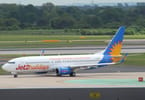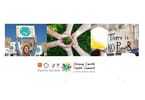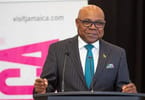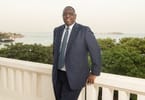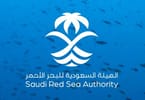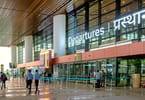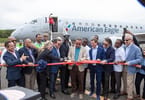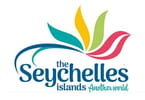Today, we conclude the series of interviews taken with leading conservationists from the Seychelles islands, recorded while on a visit to the archipelago a few weeks ago, this one with the acting CEO of the Island Conservation Society, Mr. Riaz Aumeeruddy.
eTurboNews: What are the objectives, briefs, and main activities of the Island Conservation Society; tell us a little about it.
Riaz Aumeeruddy: Our society is registered here as an NGO since 2001, and our main field of activity is conservation, of course. One of our major projects is the management of Aride Island, which is about 9 kilometers off Praslin Island. The original owners had already given the island for conservation purposes to a UK-based NGO, the Royal Society for Nature Protection, which later became the Royal Society for Wildlife Trust. In 2003, most likely because it was difficult for them to continue [to] manage Aride from so far away, they accepted our offer to manage the island on their behalf on a lease basis. Since then, we have been managing Aride as a nature reserve and marine reserve. We do permit day visitors on the island, tourists mainly, who come in the morning and then leave again in the afternoon. There is no accommodation for tourists, although we have a team of rangers on the island who also live there.
These rangers also conduct the guided tours for visitors, who spend about 5 hours at most on Aride. The main attraction, besides the flora, [is] the sea birds on the island, of which there are very large numbers and a great variety. We also reintroduced rare birds, like the Seychelles Warbler and the Magpie Robin, which is only found on 5 of the 115 islands of the Seychelles.
Part of our work is monitoring of the habitat, and it shows that for the past decades, conservation was the main purpose on the island, of course.
We do get researchers once in a while from abroad, but our limitations are to accommodate them, as we only keep staff houses for our rangers, so that limits us to host more researchers and scientists from abroad. We do have plans to begin a major refurbishment soon, to improve the living conditions for our staff that will also then offer better facilities for visiting scientists. Once completed, this will solve the problem of shared accommodation for staff, giving each one their own privacy, which has been a challenge in regard of retaining staff on the island. In comparison, we receive a lot less visitors than for instance Cousin and Cousine, but offer a very personalized service during the tours across the island, which visitors really appreciate, [with] this type of one-on-one contact with our guides and staff.
Besides managing Aride we also consult in regard of environmental issues on the islands, cooperate with the Island Development Company, and give guidance and advice about eco-tourism. We did sign an MoU with the IDC, which is a governmental body and oversees the outer islands. We act as conservation advisors and managers for IDC. Here, we have capacity limits – we cannot work on all islands, on all possible projects, so we must always make a choice where we go and what we do there.
What is relatively new is that when a developer comes to propose a project on one of these islands, they must commit an agreed amount towards conservation. This is done by forming a foundation for that island, which then manages the funds, and uses funds for conservation and restoration measures. In this foundation, the developers are represented, IDC is represented, the Ministry of Environment is represented, and we are represented to have a balance vis-a-vis interests; conservation must always be our top priority.
Our part is then to develop work plans, draw up project proposals, and submit budgets for what has to be done or what should be done. We had a good start with this way of operating on the island of Alphonse, where we set up a conservation center three years ago with permanent staff, just a few, and they look after turtles, plants, birds, coral, fish, etc.
Tourism for Alphonse are mostly fly fishermen who come normally for a week, and there, in conjunction with the hotel, our staff gives talks to them, gives them conservation overviews, does guided tours, and explains the do’s and don’ts to visitors. The hotel there pays a royalty per guest into the conservation foundation, which helps to meet the expenses of the conservation work.
A similar project is now underway since about May last year on Desroches Island where, like for Alphonse ,we produced a management plan to make sure conservation is always the main focus. These plans cover about 5 years and annual work plans are drawn up accordingly.
eTN: Does every island have a separate foundation? Is one being set up whenever development is approved somewhere?
Aumeeruddy: Yes, every island gets its own foundation responsible for that location and funded by developers, which is part of looking after the environment.
eTN: Are you cooperating with other NGOs?
Aumeeruddy: Yes we do; we recently signed an agreement with the Nature Protection Trust of Seychelles – they are based on the island of Silhouette – and, of course, we exchange views and seek input from others where special advice is needed, special expertise required. This extends to Nature Seychelles, the Seychelles Island Foundation and others, of course.
We did sign an MoU also with D’Arros Island in January to cooperate and share findings and pool resources for training, for instance, and maybe share logistical support. (eTN did report this at the time.)
eTN: Would you like to expand your scope – do more?
Aumeeruddy: Oh yes, of course, we would like to do more – there is so much to be done, but we are limited by both budget and capacity of staff. For instance, we would like to do more on habitat, vegetation restoration; even on the islands, we are active and have been active for a while, like bringing indigenous vegetation back where old coconut plantations presently exist, but this is a big challenge, financially and logistically. Manpower is a challenge, to find trained competent staff and retain them on these locations, but so is money, of course, finding the funds.
One of our staff on Alphonse for instance left in December, and I simply could not find a Seychellois with the required background, job competence, and experience to replace him, so now we are looking internationally for such a person. This is a lengthy process, though, but almost inevitable right now.
eTN: Where does the funding come from?
Aumeeruddy: Mainly from the foundations, but we also source funds from international bodies for specific projects for which we then write proposals towards that end. Right now we are doing some work for the Indian Ocean Commission like demarcations, so there is always some extra work and income.
eTN: Does the piracy issue affect your work?
Aumeeruddy: We are not directly affected, had no direct encounters, but we are now much more careful in our operations to the outer islands, and we know that other projects, further out, are much more careful now in their movement, and, of course, supply shipments are now an issue – it is more dangerous. In fact, some programs were hindered, tuned down, deferred, or delayed, halted, because of these issues, and if it takes longer, it will have an impact on some areas of research, demarcations – for sure it is not good that way, but the scientists are, of course, careful now to come into areas where there is this type of danger.
eTN: Talking of supplies, are you using diesel generators for your project work in Aride or solar panels?
Aumeeruddy: We are using a generator on Aride to have electricity. We also got some solar installations but would in the future like to convert to solar exclusively. As the operation would become more economical, we could use the funds for diesel and the transport for other activities. I am not too sure about this as the cost is also very high for the installation of solar equipment.
That is on Aride, which we manage, but on other islands where we work it is IDC supplying the logistics and infrastructure like water and electricity and we only “hook up.”
On the island of Desroches, I remember there were plans to install a heat exchanger for air conditioning. Half of the electrical power is needed to run air condition units. A heat exchanger would pump very cold water from deep ocean levels up to the surface, which can then be used, at about 5 degrees, to run the a/c units, but I am not sure how far they have gone there, but as you can see, there are plans to use sustainable and renewable sources of energy by conservation groups working on the islands.
eTN: How does your organization relate to tourism – are you broadly in support of tourism activities? What is your policy there? Are you advising developers, cooperating with them? Is there controversy?
Aumeeruddy: Many of the smaller islands have small resorts, which do not have a lot of impact, and in some cases, owners are working towards a greener profile when they renovate and modernize. I think we can help developers in many ways. You see, in the past, there were many of the smaller outlying islands dedicated to produce copra from coconuts, but that has reduced now, and now these islands have a bit of a problem – their original economic activity has gone, and they need something else to do. It is there we advise government and developers about new technologies, best practice.
eTN: Does government, do developers, actually listen and implement your advice on the ground?
Aumeeruddy: We most of the time see good results, because we also discuss it together, and when developers don’t listen, there is not enough we can do really, but mostly they do comply. There is a mechanism when things are agreed and not done to improve on what developers are doing.
eTN: Would you think of yourself as the ‘green conscience’ for the islands?
Aumeeruddy: Well, part of it; every one of our colleagues is doing their bit, but it does take time to build consciousness, change mentality, change people’s thinking, to create awareness of best practice, new technologies, better ways of doing things; we are confident though.
eTN: Do you work with international development partners? Do you receive funding support?
Aumeeruddy: There are some GEF projects, which are being implemented right now across the country, and all the national ones are implemented with and by UNEP. I am sitting on the steering committee of one project, working with our partners, and we can, of course, bid for project management and implementation.
The problem we all have is the availability of enough local capacity, technical expertise, to do all those projects which could be done, so there are manpower limitations for us, for our colleagues across the board, which is a big problem.
But the same problem you have in the hotel sector, too, in constructions, in other sectors of the economy; it is a national issue to have enough trained staff, enough competent, experienced, and motivated staff from within the Seychelles.
eTN: What is your main message for our readers?
Aumeeruddy: I think what we aim for is to assist the country to move towards sustainability, so that in 20 or 30 years they still have a good intact environment. We need to combat invasive species where they are found. We are also working with schools on the islands to have children understand our work, environmental issues, and that is going well. The schools have in their curriculum some elements, which we can complement; they have eco clubs, wildlife clubs – we would like to do more but simply lack the staff to expand on that.
But we do once a week have a column in the national newspaper, which also gives exposure, widens our reach amongst the population.
We have produced a DVD/CD for use by teachers in school and that is also helping them to propagate this, and the Indian Ocean Commission has, in fact, given us some funding to produce the material for use in schools and education institutions.
eTN: Thank you, Mr. Aumeeruddy, for your time and all the best in the future for your organization.
See www.islandconservationsociety.com for more details and, in particular, a complete photo gallery of ICS’s work on Aride Island.
WHAT TO TAKE AWAY FROM THIS ARTICLE:
- Today, we conclude the series of interviews taken with leading conservationists from the Seychelles islands, recorded while on a visit to the archipelago a few weeks ago, this one with the acting CEO of the Island Conservation Society, Mr.
- Part of our work is monitoring of the habitat, and it shows that for the past decades, conservation was the main purpose on the island, of course.
- We had a good start with this way of operating on the island of Alphonse, where we set up a conservation center three years ago with permanent staff, just a few, and they look after turtles, plants, birds, coral, fish, etc.




